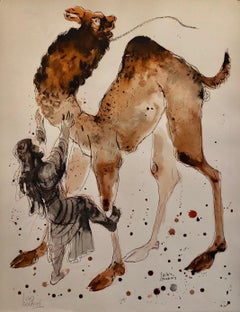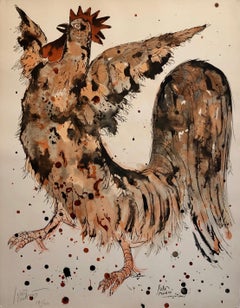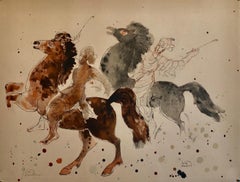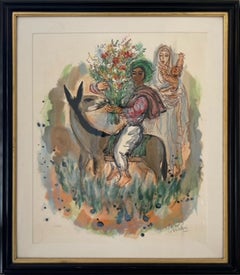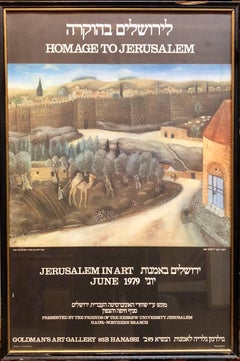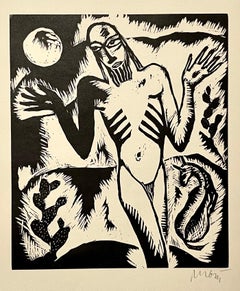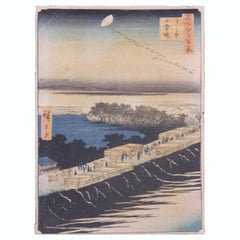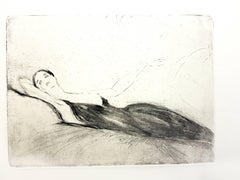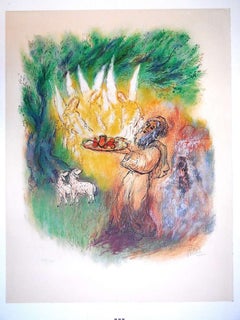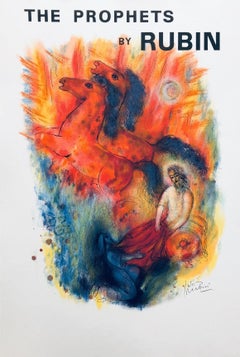Reuven Rubin Prints and Multiples
Israeli, 1893-1974
Reuven Rubin- (November 13, 1893 - October 13, 1974) was a Romanian-born Israeli painter and Israel's first ambassador to Romania. Rubin Zelicovici (later Reuven Rubin) was born in Galaţi to a poor Romanian Jewish Hasidic family. He was the eighth of 13 children. In 1912, he left for Ottoman-ruled Palestine to study art at Bezalel Academy of Art and Design in Jerusalem. Finding himself at odds with the artistic views of the Academy's teachers, he left for Paris, France, in 1913 to pursue his studies at the École Nationale Supérieure des Beaux-Arts. At the outbreak of World War I, he was returned to Romania, where he spent the war years.
In 1921, he traveled to the United States with his friend and fellow artist, Arthur Kolnik, with whom he had shared a studio in Cernăuţi. In New York City, the two met artist Alfred Stieglitz, who was instrumental in organizing their first American show at the Anderson Gallery. Following the exhibition, in 1922, they both returned to Europe. In 1923, Rubin emigrated to Mandate Palestine.
Rubin met his wife, Esther, in 1928, aboard a passenger ship to Palestine on his return from a show in New York. She was a Bronx girl who had won a trip to Palestine in a Young Judea competition. He died in 1974.(Biography provided by Kings Gallery)
to
18
3
1
17
1
5
11
2
Overall Height
to
Overall Width
to
4
4
1
1
12
11
9
4
4
3
2
2
1
1
1
1
17
1
4
4
7
27
986
695
659
626
13
5
5
4
4
Artist: Reuven Rubin
Modern Israeli Lithograph Reuven Rubin Views Of Israel Judaica Camel Rider
By Reuven Rubin
Located in Surfside, FL
Lithograph printed by Chez Daniel Jacomet, Paris, France 1960 offset lithograph in colors on Arches, signed in crayon on the justification sheet (this auction is just for the one lit...
Category
1960s Modern Reuven Rubin Prints and Multiples
Materials
Lithograph, Offset
Modern Israeli Lithograph Reuven Rubin Views Of Israel Judaica Crowing Rooster
By Reuven Rubin
Located in Surfside, FL
Lithograph printed by Chez Daniel Jacomet, Paris, France 1960 offset lithograph in colors on Arches, signed in crayon on the justification sheet (this auction is just for the one lit...
Category
1960s Modern Reuven Rubin Prints and Multiples
Materials
Lithograph, Offset
Modern Israeli Lithograph Reuven Rubin Views Of Israel Judaica Horses, Riders
By Reuven Rubin
Located in Surfside, FL
Lithograph printed by Chez Daniel Jacomet, Paris, France 1960 offset lithograph in colors on Arches, signed in crayon on the justification sheet (this auction is just for the one lit...
Category
1960s Modern Reuven Rubin Prints and Multiples
Materials
Lithograph, Offset
Untitled, Lithograph by Reuven Rubin
By Reuven Rubin
Located in Long Island City, NY
This lithograph by Reuven Rubin features a captivating scene where a man gracefully rides atop a donkey, enveloped by a lush and vibrant garden filled with a profusion of colorful fl...
Category
2010s Reuven Rubin Prints and Multiples
Materials
Lithograph
Offset Lithograph Poster Homage to Jerusalem Painting by Israeli Reuven Rubin
By Reuven Rubin
Located in Surfside, FL
Jerusalem themed poster of painting by Israeli Master.
Reuven Rubin 1893 -1974 was a Romanian-born Israeli painter and Israel's first ambassador to Romania.
Rubin Zelicovici (later Reuven Rubin) was born in Galati to a poor Romanian Jewish Hasidic family. He was the eighth of 13 children. In 1912, he left for Ottoman-ruled Palestine to study art at Bezalel Academy of Art and Design in Jerusalem. Finding himself at odds with the artistic views of the Academy's teachers, he left for Paris, France, in 1913 to pursue his studies at the École Nationale Supérieure des Beaux-Arts. At the outbreak of World War I, he was returned to Romania, where he spent the war years.
In 1921, he traveled to the United States with his friend and fellow artist, Arthur Kolnik, with whom he had shared a studio in Cern?u?i. In New York City, the two met artist Alfred Stieglitz, who was instrumental in organizing their first American show at the Anderson Gallery.Following the exhibition, in 1922, they both returned to Europe. In 1923, Rubin emigrated to Mandate Palestine.
Rubin met his wife, Esther, in 1928, aboard a passenger ship to Palestine on his return from a show in New York. She was a Bronx girl who had won a trip to Palestine in a Young Judea competition.He died in 1974
Artistic career
Joseph Zaritsky...
Category
1970s Modern Reuven Rubin Prints and Multiples
Materials
Offset
Rare 1923 Cubist Reuven Rubin Woodcut Woodblock Kabbalah Print Israeli Judaica
By Reuven Rubin
Located in Surfside, FL
This is from the original first edition 1923 printing. there was a much later edition done after these originals.
These are individually hand signed in pencil by artist as issued.
This listing is for the one print. the other documentation is included here for provenance and is not included in this listing.
The various images inspired by the Jewish Mysticism and rabbis and mystics of jerusalem and Kabbalah is holy, dramatic and optimistic Rubin succeeded to evoke the spirit of life in Israel in those early days.
They are done in a modern art style influenced by German Expressionism, particularly, Ernst Barlach, Ernst Ludwig Kirchner, and Franz Marc, as introduced to Israel by Jakob Steinhardt, Hermann Struck and Joseph Budko.
Reuven Rubin 1893 -1974 was a Romanian-born Israeli painter and Israel's first ambassador to Romania.
Rubin Zelicovich (later Reuven Rubin) was born in Galati to a poor Romanian Jewish Hasidic family. He was the eighth of 13 children. In 1912, he left for Ottoman-ruled Palestine to study art at Bezalel Academy of Art and Design in Jerusalem. Finding himself at odds with the artistic views of the Academy's teachers, he left for Paris, France, in 1913 to pursue his studies at the École Nationale Supérieure des Beaux-Arts. He was of the well known Jewish artists in Paris along with Marc Chagall and Chaim Soutine,
At the outbreak of World War I, he was returned to Romania, where he spent the war years.
In 1921, he traveled to the United States with his friend and fellow artist, Arthur Kolnik. In New York City, the two met artist Alfred Stieglitz, who was instrumental in organizing their first American show at the Anderson Gallery. Following the exhibition, in 1922, they both returned to Europe. In 1923, Rubin emigrated to Mandate Palestine.
Rubin met his wife, Esther, in 1928, aboard a passenger ship to Palestine on his return from a show in New York. She was a Bronx girl who had won a trip to Palestine in a Young Judaea competition. He died in 1974.
Part of the early generation of artists in Israel, Joseph Zaritsky, Arieh Lubin, Reuven Rubin, Sionah Tagger, Pinchas Litvinovsky, Mordecai Ardon, Yitzhak Katz, and Baruch Agadati; These painters depicted the country’s landscapes in the 1920s rebelled against the Bezalel school of Boris Schatz. They sought current styles in Europe that would help portray their own country’s landscape, in keeping with the spirit of the time. Rubin’s Cezannesque landscapes from the 1920s were defined by both a modern and a naive style, portraying the landscape and inhabitants of Israel in a sensitive fashion. His landscape paintings in particular paid special detail to a spiritual, translucent light. His early work bore the influences of Futurism, Vorticism, Cubism and Surrealism.
In Palestine, he became one of the founders of the new Eretz-Yisrael style. Recurring themes in his work were the bible, the prophet, the biblical landscape, folklore and folk art, people, including Yemenite, Hasidic Jews and Arabs. Many of his paintings are sun-bathed depictions of Jerusalem and the Galilee. Rubin might have been influenced by the work of Henri Rousseau whose naice style combined with Eastern nuances, as well as with the neo-Byzantine art to which Rubin had been exposed in his native Romania. In accordance with his integrative style, he signed his works with his first name in Hebrew and his surname in Roman letters.
In 1924, he was the first artist to hold a solo exhibition at the Tower of David, in Jerusalem (later exhibited in Tel Aviv at Gymnasia Herzliya). That year he was elected chairman of the Association of Painters and Sculptors of Palestine. From the 1930s onwards, Rubin designed backdrops for Habima Theater, the Ohel Theater and other theaters.
His biography, published in 1969, is titled My Life - My Art. He died in Tel Aviv in October 1974, after having bequeathed his home on 14 Bialik Street and a core collection of his paintings to the city of Tel Aviv. The Rubin Museum opened in 1983. The director and curator of the museum is his daughter-in-law, Carmela Rubin. Rubin's paintings are now increasingly sought after. At a Sotheby's auction in New York in 2007, his work accounted for six of the ten top lots. Along with Yaacov Agam and Menashe Kadishman he is among Israel's best known artists internationally. Education
1912 Bezalel Academy of Arts and Design, Jerusalem
1913-14 École des Beaux Arts, Paris and Académie Colarossi, Paris
Select Group Exhibitions
Eged - Palestine Painters Group Eged - Palestine Painters Group, Allenby Street, Tel Aviv 1929
Artists: Chana Orloff, Abraham Melnikoff, Rubin, Reuven Nahum Gutman, Sionah Tagger,Arieh Allweil,
Jewish Artists Association, Levant Fair, Tel Aviv, 1929
Artists: Ludwig Blum,Eliyahu Sigad, Shmuel Ovadyahu, Itzhak Frenel Frenkel,Ozer Shabat, Menahem Shemi...
Category
1920s Abstract Reuven Rubin Prints and Multiples
Materials
Woodcut
Rare 1923 Cubist Reuven Rubin Woodcut Woodblock Print Israeli Hasidic Judaica
By Reuven Rubin
Located in Surfside, FL
This is from the original first edition 1923 printing. there was a much later edition done after these originals.
These are individually hand signed in pencil by artist as issued.
This listing is for the one print. the other documentation is included here for provenance and is not included in this listing.
The various images inspired by the Jewish Mysticism and rabbis and mystics of jerusalem and Kabbalah is holy, dramatic and optimistic Rubin succeeded to evoke the spirit of life in Israel in those early days.
They are done in a modern art style influenced by German Expressionism, particularly, Ernst Barlach, Ernst Ludwig Kirchner, and Franz Marc, as introduced to Israel by Jakob Steinhardt, Hermann Struck and Joseph Budko.
Reuven Rubin 1893 -1974 was a Romanian-born Israeli painter and Israel's first ambassador to Romania.
Rubin Zelicovich (later Reuven Rubin) was born in Galati to a poor Romanian Jewish Hasidic family. He was the eighth of 13 children. In 1912, he left for Ottoman-ruled Palestine to study art at Bezalel Academy of Art and Design in Jerusalem. Finding himself at odds with the artistic views of the Academy's teachers, he left for Paris, France, in 1913 to pursue his studies at the École Nationale Supérieure des Beaux-Arts. He was of the well known Jewish artists in Paris along with Marc Chagall and Chaim Soutine,
At the outbreak of World War I, he was returned to Romania, where he spent the war years.
In 1921, he traveled to the United States with his friend and fellow artist, Arthur Kolnik. In New York City, the two met artist Alfred Stieglitz, who was instrumental in organizing their first American show at the Anderson Gallery. Following the exhibition, in 1922, they both returned to Europe. In 1923, Rubin emigrated to Mandate Palestine.
Rubin met his wife, Esther, in 1928, aboard a passenger ship to Palestine on his return from a show in New York. She was a Bronx girl who had won a trip to Palestine in a Young Judaea competition. He died in 1974.
Part of the early generation of artists in Israel, Joseph Zaritsky, Arieh Lubin, Reuven Rubin, Sionah Tagger, Pinchas Litvinovsky, Mordecai Ardon, Yitzhak Katz, and Baruch Agadati; These painters depicted the country’s landscapes in the 1920s rebelled against the Bezalel school of Boris Schatz. They sought current styles in Europe that would help portray their own country’s landscape, in keeping with the spirit of the time. Rubin’s Cezannesque landscapes from the 1920s were defined by both a modern and a naive style, portraying the landscape and inhabitants of Israel in a sensitive fashion. His landscape paintings in particular paid special detail to a spiritual, translucent light. His early work bore the influences of Futurism, Vorticism, Cubism and Surrealism.
In Palestine, he became one of the founders of the new Eretz-Yisrael style. Recurring themes in his work were the bible, the prophet, the biblical landscape, folklore and folk art, people, including Yemenite, Hasidic Jews and Arabs. Many of his paintings are sun-bathed depictions of Jerusalem and the Galilee. Rubin might have been influenced by the work of Henri Rousseau whose naice style combined with Eastern nuances, as well as with the neo-Byzantine art to which Rubin had been exposed in his native Romania. In accordance with his integrative style, he signed his works with his first name in Hebrew and his surname in Roman letters.
In 1924, he was the first artist to hold a solo exhibition at the Tower of David, in Jerusalem (later exhibited in Tel Aviv at Gymnasia Herzliya). That year he was elected chairman of the Association of Painters and Sculptors of Palestine. From the 1930s onwards, Rubin designed backdrops for Habima Theater, the Ohel Theater and other theaters.
His biography, published in 1969, is titled My Life - My Art. He died in Tel Aviv in October 1974, after having bequeathed his home on 14 Bialik Street and a core collection of his paintings to the city of Tel Aviv. The Rubin Museum opened in 1983. The director and curator of the museum is his daughter-in-law, Carmela Rubin. Rubin's paintings are now increasingly sought after. At a Sotheby's auction in New York in 2007, his work accounted for six of the ten top lots. Along with Yaacov Agam and Menashe Kadishman he is among Israel's best known artists internationally. Education
1912 Bezalel Academy of Arts and Design, Jerusalem
1913-14 École des Beaux Arts, Paris and Académie Colarossi, Paris
Select Group Exhibitions
Eged - Palestine Painters Group Eged - Palestine Painters Group, Allenby Street, Tel Aviv 1929
Artists: Chana Orloff, Abraham Melnikoff, Rubin, Reuven Nahum Gutman, Sionah Tagger,Arieh Allweil,
Jewish Artists Association, Levant Fair, Tel Aviv, 1929
Artists: Ludwig Blum,Eliyahu Sigad, Shmuel Ovadyahu, Itzhak Frenel Frenkel,Ozer Shabat, Menahem Shemi,
First Exhibition of ''Hever Omanim'' First Exhibition of ''Hever Omanim''
Steimatzky Gallery, Jerusalem
1936
Artists:
Gutman, Nachum Holzman, Shimshon Mokady, Moshe Sima, Miron Rubin, Reuven Steinhardt, Jakob Ben Zvi, Zeev Ziffer, Moshe Allweil, Arieh
Group Exhibition Group Exhibition
Katz Art Gallery, Tel Aviv
1939
Artists:
Avni, Aharon Holzman, Shimshon Gliksberg, Haim Gutman, Nachum Ovadyahu, Shmuel Shorr, Zvi Schwartz, Chaya Streichman, Yehezkel Tagger, Sionah Rubin, Reuven
A Collection of Works by Artists of the Land of Israel A Collection of Works by Artists of the Land of Israel
The Bezalel National Museum, Jerusalem
1940
Artists:
Shemi, Menahem Rubin, Reuven Avni, Aharon Mokady, Moshe Jonas, Ludwig Steinhardt, Jakob Ticho, Anna Krakauer, Leopold Gutman, Nachum Budko, Joseph Ardon, Mordecai Sima, Miron Castel, Moshe Pann, Abel Struck, Hermann Gur Arie, Meir Ben Zvi, Zeev Litvinovsky, Pinchas
Artists in Israel for the Defense, Tel Aviv Museum of Art, Helena Rubinstein Pavilion, Tel Aviv 1967
Artists: Avraham Binder, Motke Blum, (Mordechai) Samuel Bak, Yosl Bergner, Nahum Gilboa, Jean David, Marcel Janco, Lea Nikel, Jacob Pins, Esther Peretz...
Category
1920s Abstract Reuven Rubin Prints and Multiples
Materials
Woodcut
Rare 1923 Cubist Reuven Rubin Woodcut Woodblock Print Israeli Hasidic Judaica
By Reuven Rubin
Located in Surfside, FL
This is from the original first edition 1923 printing. there was a much later edition done after these originals.
These are individually hand signed in pencil by artist as issued.
This listing is for the one print. the other documentation is included here for provenance and is not included in this listing.
The various images inspired by the Jewish Mysticism and rabbis and mystics of jerusalem and Kabbalah is holy, dramatic and optimistic Rubin succeeded to evoke the spirit of life in Israel in those early days.
They are done in a modern art style influenced by German Expressionism, particularly, Ernst Barlach, Ernst Ludwig Kirchner, and Franz Marc, as introduced to Israel by Jakob Steinhardt, Hermann Struck and Joseph Budko.
Reuven Rubin 1893 -1974 was a Romanian-born Israeli painter and Israel's first ambassador to Romania.
Rubin Zelicovich (later Reuven Rubin) was born in Galati to a poor Romanian Jewish Hasidic family. He was the eighth of 13 children. In 1912, he left for Ottoman-ruled Palestine to study art at Bezalel Academy of Art and Design in Jerusalem. Finding himself at odds with the artistic views of the Academy's teachers, he left for Paris, France, in 1913 to pursue his studies at the École Nationale Supérieure des Beaux-Arts. He was of the well known Jewish artists in Paris along with Marc Chagall and Chaim Soutine,
At the outbreak of World War I, he was returned to Romania, where he spent the war years.
In 1921, he traveled to the United States with his friend and fellow artist, Arthur Kolnik. In New York City, the two met artist Alfred Stieglitz, who was instrumental in organizing their first American show at the Anderson Gallery. Following the exhibition, in 1922, they both returned to Europe. In 1923, Rubin emigrated to Mandate Palestine.
Rubin met his wife, Esther, in 1928, aboard a passenger ship to Palestine on his return from a show in New York. She was a Bronx girl who had won a trip to Palestine in a Young Judaea competition. He died in 1974.
Part of the early generation of artists in Israel, Joseph Zaritsky, Arieh Lubin, Reuven Rubin, Sionah Tagger, Pinchas Litvinovsky, Mordecai Ardon, Yitzhak Katz, and Baruch Agadati; These painters depicted the country’s landscapes in the 1920s rebelled against the Bezalel school of Boris Schatz. They sought current styles in Europe that would help portray their own country’s landscape, in keeping with the spirit of the time. Rubin’s Cezannesque landscapes from the 1920s were defined by both a modern and a naive style, portraying the landscape and inhabitants of Israel in a sensitive fashion. His landscape paintings in particular paid special detail to a spiritual, translucent light. His early work bore the influences of Futurism, Vorticism, Cubism and Surrealism.
In Palestine, he became one of the founders of the new Eretz-Yisrael style. Recurring themes in his work were the bible, the prophet, the biblical landscape, folklore and folk art, people, including Yemenite, Hasidic Jews and Arabs. Many of his paintings are sun-bathed depictions of Jerusalem and the Galilee. Rubin might have been influenced by the work of Henri Rousseau whose naice style combined with Eastern nuances, as well as with the neo-Byzantine art to which Rubin had been exposed in his native Romania. In accordance with his integrative style, he signed his works with his first name in Hebrew and his surname in Roman letters.
In 1924, he was the first artist to hold a solo exhibition at the Tower of David, in Jerusalem (later exhibited in Tel Aviv at Gymnasia Herzliya). That year he was elected chairman of the Association of Painters and Sculptors of Palestine. From the 1930s onwards, Rubin designed backdrops for Habima Theater, the Ohel Theater and other theaters.
His biography, published in 1969, is titled My Life - My Art. He died in Tel Aviv in October 1974, after having bequeathed his home on 14 Bialik Street and a core collection of his paintings to the city of Tel Aviv. The Rubin Museum opened in 1983. The director and curator of the museum is his daughter-in-law, Carmela Rubin. Rubin's paintings are now increasingly sought after. At a Sotheby's auction in New York in 2007, his work accounted for six of the ten top lots. Along with Yaacov Agam and Menashe Kadishman he is among Israel's best known artists internationally. Education
1912 Bezalel Academy of Arts and Design, Jerusalem
1913-14 École des Beaux Arts, Paris and Académie Colarossi, Paris
Select Group Exhibitions
Eged - Palestine Painters Group Eged - Palestine Painters Group, Allenby Street, Tel Aviv 1929
Artists: Chana Orloff, Abraham Melnikoff, Rubin, Reuven Nahum Gutman, Sionah Tagger,Arieh Allweil,
Jewish Artists Association, Levant Fair, Tel Aviv, 1929
Artists: Ludwig Blum,Eliyahu Sigad, Shmuel Ovadyahu, Itzhak Frenel Frenkel,Ozer Shabat, Menahem Shemi...
Category
1920s Abstract Reuven Rubin Prints and Multiples
Materials
Woodcut
Rare 1923 Cubist Reuven Rubin Woodcut Woodblock Fisherman Print Israeli Judaica
By Reuven Rubin
Located in Surfside, FL
This is from the original first edition 1923 printing. there was a much later edition done after these originals.
These are individually hand signed in pencil by artist as issued.
This listing is for the one print. the other documentation is included here for provenance and is not included in this listing.
The various images inspired by the Jewish Mysticism and rabbis and mystics of jerusalem and Kabbalah is holy, dramatic and optimistic Rubin succeeded to evoke the spirit of life in Israel in those early days.
They are done in a modern art style influenced by German Expressionism, particularly, Ernst Barlach, Ernst Ludwig Kirchner, and Franz Marc, as introduced to Israel by Jakob Steinhardt, Hermann Struck and Joseph Budko.
Reuven Rubin 1893 -1974 was a Romanian-born Israeli painter and Israel's first ambassador to Romania.
Rubin Zelicovich (later Reuven Rubin) was born in Galati to a poor Romanian Jewish Hasidic family. He was the eighth of 13 children. In 1912, he left for Ottoman-ruled Palestine to study art at Bezalel Academy of Art and Design in Jerusalem. Finding himself at odds with the artistic views of the Academy's teachers, he left for Paris, France, in 1913 to pursue his studies at the École Nationale Supérieure des Beaux-Arts. He was of the well known Jewish artists in Paris along with Marc Chagall and Chaim Soutine,
At the outbreak of World War I, he was returned to Romania, where he spent the war years.
In 1921, he traveled to the United States with his friend and fellow artist, Arthur Kolnik. In New York City, the two met artist Alfred Stieglitz, who was instrumental in organizing their first American show at the Anderson Gallery. Following the exhibition, in 1922, they both returned to Europe. In 1923, Rubin emigrated to Mandate Palestine.
Rubin met his wife, Esther, in 1928, aboard a passenger ship to Palestine on his return from a show in New York. She was a Bronx girl who had won a trip to Palestine in a Young Judaea competition. He died in 1974.
Part of the early generation of artists in Israel, Joseph Zaritsky, Arieh Lubin, Reuven Rubin, Sionah Tagger, Pinchas Litvinovsky, Mordecai Ardon, Yitzhak Katz, and Baruch Agadati; These painters depicted the country’s landscapes in the 1920s rebelled against the Bezalel school of Boris Schatz. They sought current styles in Europe that would help portray their own country’s landscape, in keeping with the spirit of the time. Rubin’s Cezannesque landscapes from the 1920s were defined by both a modern and a naive style, portraying the landscape and inhabitants of Israel in a sensitive fashion. His landscape paintings in particular paid special detail to a spiritual, translucent light. His early work bore the influences of Futurism, Vorticism, Cubism and Surrealism.
In Palestine, he became one of the founders of the new Eretz-Yisrael style. Recurring themes in his work were the bible, the prophet, the biblical landscape, folklore and folk art, people, including Yemenite, Hasidic Jews and Arabs. Many of his paintings are sun-bathed depictions of Jerusalem and the Galilee. Rubin might have been influenced by the work of Henri Rousseau whose naice style combined with Eastern nuances, as well as with the neo-Byzantine art to which Rubin had been exposed in his native Romania. In accordance with his integrative style, he signed his works with his first name in Hebrew and his surname in Roman letters.
In 1924, he was the first artist to hold a solo exhibition at the Tower of David, in Jerusalem (later exhibited in Tel Aviv at Gymnasia Herzliya). That year he was elected chairman of the Association of Painters and Sculptors of Palestine. From the 1930s onwards, Rubin designed backdrops for Habima Theater, the Ohel Theater and other theaters.
His biography, published in 1969, is titled My Life - My Art. He died in Tel Aviv in October 1974, after having bequeathed his home on 14 Bialik Street and a core collection of his paintings to the city of Tel Aviv. The Rubin Museum opened in 1983. The director and curator of the museum is his daughter-in-law, Carmela Rubin. Rubin's paintings are now increasingly sought after. At a Sotheby's auction in New York in 2007, his work accounted for six of the ten top lots. Along with Yaacov Agam and Menashe Kadishman he is among Israel's best known artists internationally. Education
1912 Bezalel Academy of Arts and Design, Jerusalem
1913-14 École des Beaux Arts, Paris and Académie Colarossi, Paris
Select Group Exhibitions
Eged - Palestine Painters Group Eged - Palestine Painters Group, Allenby Street, Tel Aviv 1929
Artists: Chana Orloff, Abraham Melnikoff, Rubin, Reuven Nahum Gutman, Sionah Tagger,Arieh Allweil,
Jewish Artists Association, Levant Fair, Tel Aviv, 1929
Artists: Ludwig Blum,Eliyahu Sigad, Shmuel Ovadyahu, Itzhak Frenel Frenkel,Ozer Shabat, Menahem Shemi,
First Exhibition of ''Hever Omanim'' First Exhibition of ''Hever Omanim''
Steimatzky Gallery, Jerusalem
1936
Artists:
Gutman, Nachum Holzman, Shimshon Mokady, Moshe Sima, Miron Rubin, Reuven Steinhardt, Jakob Ben Zvi, Zeev Ziffer, Moshe Allweil, Arieh
Group Exhibition Group Exhibition
Katz Art Gallery, Tel Aviv
1939
Artists:
Avni, Aharon Holzman, Shimshon Gliksberg, Haim Gutman, Nachum Ovadyahu, Shmuel Shorr, Zvi Schwartz, Chaya Streichman, Yehezkel Tagger, Sionah Rubin, Reuven
A Collection of Works by Artists of the Land of Israel A Collection of Works by Artists of the Land of Israel
The Bezalel National Museum, Jerusalem
1940
Artists:
Shemi, Menahem Rubin, Reuven Avni, Aharon Mokady, Moshe Jonas, Ludwig Steinhardt, Jakob Ticho, Anna Krakauer, Leopold Gutman, Nachum Budko, Joseph Ardon, Mordecai Sima, Miron Castel, Moshe Pann, Abel Struck, Hermann Gur Arie, Meir Ben Zvi, Zeev Litvinovsky, Pinchas
Artists in Israel for the Defense, Tel Aviv Museum of Art, Helena Rubinstein Pavilion, Tel Aviv 1967
Artists: Avraham Binder, Motke Blum, (Mordechai) Samuel Bak, Yosl Bergner, Nahum Gilboa, Jean David, Marcel Janco, Lea Nikel, Jacob Pins, Esther Peretz...
Category
1920s Abstract Reuven Rubin Prints and Multiples
Materials
Woodcut
Bible lithograph, Moses with the Ten Commandments
By Reuven Rubin
Located in Surfside, FL
Lithograph printed by Mourlot, Paris on Arches France paper. limited edition of 150. Pencil signed.
Biblical themed Lithograph by Israeli Master.
Reuven Rubin 1893 -1974 was a Romanian-born Israeli painter and Israel's first ambassador to Romania.
Rubin Zelicovici (later Reuven Rubin) was born in Gala?i to a poor Romanian Jewish...
Category
1970s Reuven Rubin Prints and Multiples
Materials
Archival Paper, Lithograph
Negev Aglow
By Reuven Rubin
Located in Long Island City, NY
Artist: Reuven Rubin, Israeli (1893 - 1974)
Title: Negev Aglow
Year: circa 1965
Medium: Lithograph, signed and numbered in pencil
Edition: 77/200
Image Size: 19 x 25 inches
Frame: 30...
Category
1960s Expressionist Reuven Rubin Prints and Multiples
Materials
Lithograph
Bible Lithograph, King David
By Reuven Rubin
Located in Surfside, FL
Lithograph printed by Mourlot, Paris on Arches France paper. limited edition of 150. Pencil signed.
Biblical themed Lithograph by Israeli Master.
Reuven Rubin 1893 -1974 was a Romanian-born Israeli painter and Israel's first ambassador to Romania.
Rubin Zelicovici (later Reuven Rubin) was born in Gala?i to a poor Romanian Jewish...
Category
1970s Reuven Rubin Prints and Multiples
Materials
Archival Paper, Lithograph
Bible Lithograph, Angel
By Reuven Rubin
Located in Surfside, FL
Lithograph printed by Mourlot, Paris on Arches France paper. limited edition of 150. Pencil signed.
Biblical themed Lithograph by Israeli Master.
Reuven Rubin 1893 -1974 was a Romanian-born Israeli painter and Israel's first ambassador to Romania.
Rubin Zelicovici (later Reuven Rubin) was born in Gala?i to a poor Romanian Jewish...
Category
1970s Reuven Rubin Prints and Multiples
Materials
Archival Paper, Lithograph
Bible Lithograph, Jacob, Israel
By Reuven Rubin
Located in Surfside, FL
Lithograph printed by Mourlot, Paris on Arches France paper. limited edition of 150. Pencil signed.
Biblical themed Lithograph by Israeli Master.
Reuven Rubin 1893 -1974 was a Romanian-born Israeli painter and Israel's first ambassador to Romania.
Rubin Zelicovici (later Reuven Rubin) was born in Gala?i to a poor Romanian Jewish...
Category
1970s Reuven Rubin Prints and Multiples
Materials
Archival Paper, Lithograph
Bible Lithograph, Chariot of Elijah
By Reuven Rubin
Located in Surfside, FL
Lithograph printed by Mourlot, Paris on Arches France paper. limited edition of 150. Pencil signed. image of Horses with Chariot. (I believe it is from Elijah)
Biblical themed Lithograph by Israeli Master.
Reuven Rubin 1893 -1974 was a Romanian-born Israeli painter and Israel's first ambassador to Romania.
Rubin Zelicovici (later Reuven Rubin) was born in Gala?i to a poor Romanian Jewish...
Category
1970s Reuven Rubin Prints and Multiples
Materials
Archival Paper, Lithograph
Mother and Child
By Reuven Rubin
Located in New York, NY
Mother and Child by Reuven Rubin (1893-1974)
Pencil on paper
25 ¼ x 19 ¼ inches unframed (64.135 x 48.895 cm)
35 ¼ x 29 ½ inches framed (89.535 x 74.93 cm)
Signed on bottom right
De...
Category
20th Century Reuven Rubin Prints and Multiples
Materials
Mixed Media, Lithograph
Fishers
By Reuven Rubin
Located in New York, NY
Fishers, ca. 1960, by Reuven Rubin (1893-1974)
Lithograph on paper
19 × 13 ⅜ inches unframed (48.26 x 33.985 cm)
Signed on bottom right
inscribed (330110 #01 x8345) on reverse bottom...
Category
20th Century Post-Modern Reuven Rubin Prints and Multiples
Materials
Mixed Media, Lithograph
Visions of the Bible Portfolio, 12 Lithographs by Reuven Rubin
By Reuven Rubin
Located in Long Island City, NY
Artist: Reuven Rubin, Israeli (1893 - 1974)
Title: Visions of the Bible Portfolio
Year: 1972
Medium: 12 Lithograph Portfolio with Book in case, each print is signed and numbered in p...
Category
1970s Impressionist Reuven Rubin Prints and Multiples
Materials
Lithograph
Related Items
Nihon Embankment in Yoshiwara Japanese Woodblock Print
By Utagawa Hiroshige (Ando Hiroshige)
Located in Houston, TX
Woodblock print from the Edo period. The print was apart of a series that Hiroshige did titled, "One Hundred Famous Views of Edo". The woodblock print is printed on rice paper.
The p...
Category
1850s Edo Reuven Rubin Prints and Multiples
Materials
Woodcut
H 13.75 in W 9.5 in D 0.004 in
Jean Gabriel Domergue - Lying Woman - Original Etching
By Jean-Gabriel Domergue
Located in Collonge Bellerive, Geneve, CH
Original Etching by Jean-Gabriel Domergue
Dimensions: 33 x 25 cm
1924
Edition of 100
This artwork is part of the famous portfolio The Afternoon of a Faun.
Jean-Gabriel Domergue
Jea...
Category
1920s Impressionist Reuven Rubin Prints and Multiples
Materials
Lithograph
H 15.75 in W 12.21 in D 0.04 in
Keith Haring Secret Pastures 1984 announcement
By Keith Haring
Located in NEW YORK, NY
Keith Haring Secret Pastures 1984:
Keith Haring illustrated oversized announcement for the historic, "Secret Pastures" show at The Brookl...
Category
1980s Pop Art Reuven Rubin Prints and Multiples
Materials
Offset, Lithograph
Keith Haring Luna Luna 1986
By Keith Haring
Located in NEW YORK, NY
Keith Haring Luna Luna Karussell. A Poetic Extravaganza!, 1986 (Keith haring Luna Luna):
Luna Luna "was organized by Andre Heller for “A Fair with Mod...
Category
1980s Pop Art Reuven Rubin Prints and Multiples
Materials
Lithograph, Offset, Paper
Saul Steinberg Lithograph c.1970 (from Derrière le miroir)
By Saul Steinberg
Located in NEW YORK, NY
Saul Steinberg Lithograph c.1970:
Published by: Galerie Maeght, Paris.
Portfolio: Derrière le Miroir.
Lithograph in colors c.1970.
11 x 14 inches.
Very good overall vintage conditio...
Category
1970s Pop Art Reuven Rubin Prints and Multiples
Materials
Lithograph
Rare Original 1980s Keith Haring Vinyl Record Art (Keith Haring Hiroshima)
By Keith Haring
Located in NEW YORK, NY
Keith Haring Hiroshima 1988:
Rare 1988 7” Japanese vinyl record featuring original artwork by Keith Haring. Truly vibrant colors that make for stand-out wall art and unique vintage Keith Haring collectible. Rare and not to be passed upon.
*1st Pressing 1988 (not a re-issue)
Medium: Off-Set Lithograph on vinyl record cover and labels.
Dimensions: 7 x 7 inches.
Plate signed on lower right & dated 1988 by Haring
Light signs of handling; otherwise good to very overall vintage condition.
Includes the original record (very good condition).
Haring off-set illustrations appearing throughout the exterior and interior covers and record labels.
_
Keith Haring Album Art: a brief history:
Whether collaborating with Grace Jones, Andy Warhol, and Jean-Michel Basquiat, regularly frequenting clubs like Paradise Garage alongside close friend Larry Levan, or sketching DJ robots, New York artist and activist Keith Haring’s work was deeply entwined with the music world lending his vision to sounds by everyone from David Bowie to Run DMC. Looking for something cool to complement this work? Please feel free to browse additional items like this from Jean Michel Basquiat, Andy Warhol, Damien Hirst, Keith Haring & more on our 1stDibs gallery page.
Related Categories
Keith Haring prints. Keith Haring figurative. East Village art. Street art. 80s graffiti. Pop Art. Keith Haring animals.
Category
1980s Pop Art Reuven Rubin Prints and Multiples
Materials
Offset, Lithograph
Salvador Dali - Apparition de Dulcinée - Original Lithograph
By Salvador Dalí
Located in Collonge Bellerive, Geneve, CH
Salvador Dali - Apparition de Dulcinée - Original Lithograph
Joseph FORET, Paris, 1957
SIGNATURE : printed in the image
LIMITED : 197 copies.
SIZE : 41 x 33 cm
REFERENCES : Field 57...
Category
1950s Surrealist Reuven Rubin Prints and Multiples
Materials
Lithograph
H 16.15 in W 13 in D 0.04 in
KAWS exhibition poster 2001 (KAWS Tokyo 2001)
By KAWS
Located in NEW YORK, NY
KAWS Tokyo First Exhibit Poster 2001:
2001 KAWS Parco Gallery exhibition poster featuring a photograph by fashion photographer David Sims reimagined by KAWS in his classic 1990's interventionist style. A KAWS Kimpsons Krusty the Clown graces the background while a signature iconic KAWS Bendy wraps itself around the model. Reverse side features exhibition info from Parco Gallery, including Supreme and A Bathing Ape...
Category
21st Century and Contemporary Pop Art Reuven Rubin Prints and Multiples
Materials
Offset, Lithograph
After Pablo Picasso - The Dwarf Dancer - Handsigned and Dedicated Lithograph
By (after) Pablo Picasso
Located in Collonge Bellerive, Geneve, CH
After Pablo Picasso 1881 - 1973
The Dwarf Dancer (Barcelona Series) - 1966
Framed Offset Color lithograph signed, dated and dedicated at the bottom "For L...
Category
1960s Modern Reuven Rubin Prints and Multiples
Materials
Lithograph
H 28.98 in W 21.3 in D 0.4 in
Kuwana Station - Woodcut after Utagawa Hiroshige -1920s
By Utagawa Hiroshige
Located in Roma, IT
Kuwana Station is an original modern artwork realized after Utagawa Hiroshige (1797 – 12 October 1858) in 1920s.
Original woodcut print oban yokoe. After the famous Tokaido series, ...
Category
1920s Modern Reuven Rubin Prints and Multiples
Materials
Woodcut
No Reserve
H 8.67 in W 11.23 in D 0.04 in
Milton Glaser Temple University Music Festival poster (Milton Glaser posters)
By Milton Glaser
Located in NEW YORK, NY
Milton Glaser Temple University Music Festival, 1975:
Vintage original 1970s Milton Glaser poster designed by Milton Glaser on the occasion of the Temple University Music Festival.
A classic Milton Glaser poster & design featuring a surreal-like swan, superimposed on an enigmatic profile.
Offset lithograph poster in colors.
24 x 35 inches.
Very good overall vintage condition with the exception of perhaps some minor signs of handling.
Milton Glaser printed signature lower right; from an edition of unknown.
Commissioned by Mobil.
Literature:
Milton Glaser Posters, Glaser, pg. 193.
Legendary graphic designer, illustrator, and art director Milton Glaser created some of the most recognizable iconography in America today —including the iconic I ♥ N Y logo —and countless posters and ad campaigns. Glaser changed the face of commercial art in the 1960s and ’70s, breaking with the conventions of modernism and drawing inspiration from a wide variety of art-historical and pop-cultural sources, from Art Nouveau to comic illustration...
Category
1960s Pop Art Reuven Rubin Prints and Multiples
Materials
Offset, Lithograph
Milton Glaser Saratoga Festival 1980 (Milton Glaser posters)
By Milton Glaser
Located in NEW YORK, NY
Milton Glaser Saratoga Festival Poster 1980:
For this annual summer arts festival held in Saratoga New York, Milton Glaser places a Pan...
Category
1960s Pop Art Reuven Rubin Prints and Multiples
Materials
Lithograph, Offset
Previously Available Items
Bible Lithograph, Abraham feeding the Angels
By Reuven Rubin
Located in Surfside, FL
Lithograph printed by Mourlot, Paris on Arches France paper. limited edition of 150. Pencil signed.
Biblical themed Lithograph by Israeli Master.
Reuven Rubin 1893 -1974 was a Romanian-born Israeli painter and Israel's first ambassador to Romania.
Rubin Zelicovici (later Reuven Rubin) was born in Gala?i to a poor Romanian Jewish...
Category
1970s Reuven Rubin Prints and Multiples
Materials
Archival Paper, Lithograph
The Prophets-Lithograph, Printed in France by Mourlot
By Reuven Rubin
Located in Clinton Township, MI
Lithograph, Printed in France by Mourlot. Plate-signed. The print measures 32 x 21.5 inches and is unframed. The date of publication is unknown, but is believed to be circa 1970. The...
Category
1970s Reuven Rubin Prints and Multiples
Materials
Lithograph
Reuven Rubin Israeli Lithograph Heavenly Jerusalem Landscape with Angel Judaica
By Reuven Rubin
Located in Surfside, FL
Biblical themed Lithograph by Israeli Master.
Reuven Rubin 1893 -1974 was a Romanian-born Israeli painter and Israel's first ambassador to Romania.
Rubin Zelicovici (later Reuven Rub...
Category
Late 20th Century Reuven Rubin Prints and Multiples
Materials
Lithograph
“Horses” Framed Limited Edition Lithograph, Signed by Artist
By Reuven Rubin
Located in Clinton Township, MI
Limited Edition Lithograph, 43/150. 20.5 x 26 in, Framed. Signed by Artist. Print is in Excellent/Good Condition. Frame and matting show signs of wear/cosmetic imperfections due to a...
Category
Late 20th Century Reuven Rubin Prints and Multiples
Materials
Lithograph
Modern Israeli Lithograph Reuven Rubin Views Of Israel Judaica Fisherman, Fish
By Reuven Rubin
Located in Surfside, FL
Lithograph printed by Chez Daniel Jacomet, Paris, France 1960 offset lithograph in colors on Arches, signed in crayon on the justification sheet (this auction is just for the one lit...
Category
1960s Modern Reuven Rubin Prints and Multiples
Materials
Lithograph, Offset
Modern Israeli Lithograph Reuven Rubin Views Of Israel Judaica Crowing Rooster
By Reuven Rubin
Located in Surfside, FL
Lithograph printed by Chez Daniel Jacomet, Paris, France 1960 offset lithograph in colors on Arches, signed in crayon on the justification sheet (this auction is just for the one lithograph pictured as the 1st photo, the justification sheet with the original drawing is just included for provenance and is not part of this sale), on Arches deckle edged paper. limited edition of 250. plate signed and hand signed in pencil.
Israeli views Lithograph by Israeli Master.
Reuven Rubin 1893 -1974 was a Romanian-born Israeli painter and Israel's first ambassador to Romania.
Rubin Zelicovici (later Reuven Rubin) was born in Gala?i to a poor Romanian Jewish Hasidic family. He was the eighth of 13 children. In 1912, he left for Ottoman-ruled Palestine to study art at Bezalel Academy of Art and Design in Jerusalem. Finding himself at odds with the artistic views of the Academy's teachers, he left for Paris, France, in 1913 to pursue his studies at the École Nationale Supérieure des Beaux-Arts. At the outbreak of World War I, he was returned to Romania, where he spent the war years.
In 1921, he traveled to the United States with his friend and fellow artist, Arthur Kolnik, with whom he had shared a studio in Cernovitzu. In New York City, the two met artist Alfred Stieglitz, who was instrumental in organizing their first American show at the Anderson Gallery.Following the exhibition, in 1922, they both returned to Europe. In 1923, Rubin emigrated to Mandate Palestine.
Rubin met his wife, Esther, in 1928, aboard a passenger ship to Palestine on his return from a show in New York. She was a Bronx girl who had won a trip to Palestine in a Young Judea competition. He died in 1974
Artistic career
Joseph Zaritsky, Arieh Lubin, Yona Zeliuk, Reuven Rubin, Sionah Tagger, Pinchas Litvinovsky, Yitzhak Katz, and Baruch Agadati; The painters who depicted the country’s landscapes in the 1920s rebelled against Bezalel. They sought current styles in Europe that would help portray their own country’s landscape, in keeping with the spirit of the time. Rubin’s Cezannesque landscapes from the 1920s were defined by both a modern and a naive style, portraying the landscape and inhabitants of Israel in a sensitive fashion. His landscape paintings in particular paid special detail to a spiritual, translucent light.
In Palestine, he became one of the founders of the new Eretz-Yisrael style. Recurring themes in his work were the bible, the prophet, the biblical landscape, folklore and people, including Yemenite, Hasidic Jews and Arabs. Many of his paintings are sun-bathed depictions of Jerusalem and the Galilee. Rubin might have been influenced by the work of Henri Rousseau whose style combined with Eastern nuances, as well as with the neo-Byzantine art to which Rubin had been exposed in his native Romania. In accordance with his integrative style, he signed his works with his first name in Hebrew and his surname in Roman letters.
In 1924, he was the first artist to hold a solo exhibition at the Tower of David, in Jerusalem (later exhibited in Tel Aviv at Gymnasia Herzliya). That year he was elected chairman of the Association of Painters and Sculptors of Palestine. From the 1930s onwards, Rubin designed backdrops for Habima Theater, the Ohel Theater and other theaters.
His biography, published in 1969, is titled My Life - My Art. He died in Tel Aviv in October 1974, after having bequeathed his home on 14 Bialik Street and a core collection of his paintings to the city of Tel Aviv. The Rubin Museum opened in 1983. The director and curator of the museum is his daughter-in-law, Carmela Rubin.Rubin's paintings are now increasingly sought after. At a Sotheby's auction in New York in 2007, his work accounted for six of the ten top lots.
Selected group exhibitions:
2015 Israeli Art: The Renewed Collection Galleries, Dr. Julius and Hilde Merzbacher Galleries and the Ayala Zacks Abramov Pavilion for Israeli Art, Israel Museum, Jerusalem
Artists: Reuven Rubin, Ephraim Moses Lilien, Yitzhak Danziger, Lea Nikel, Naftali Bezem, Mordecai Ardon, David Reeb, Ruth Schloss, Yehiel Shemi, Menashe Kadishman, Avigdor Arikha, Moshe Gershuni, Moshe Geva, Tsibi Ginton, David Gitlin, Michael Klapisch, Liliane Klasmer, Gabi Krakauer, Leopold Moshe Kupferman, Sigalit Landau, Moshe Mokady, Ori Reisman...
Category
1960s Modern Reuven Rubin Prints and Multiples
Materials
Lithograph, Offset
Modern Israeli Lithograph Reuven Rubin Views Of Israel Judaica Horses, Riders
By Reuven Rubin
Located in Surfside, FL
Lithograph printed by Chez Daniel Jacomet, Paris, France 1960 offset lithograph in colors on Arches, signed in crayon on the justification sheet (this auction is just for the one lithograph pictured as the 1st photo, the justification sheet with the original drawing is just included for provenance and is not part of this sale), on Arches deckle edged paper. limited edition of 250. plate signed and hand signed in pencil.
Israeli views Lithograph by Israeli Master.
Reuven Rubin 1893 -1974 was a Romanian-born Israeli painter and Israel's first ambassador to Romania.
Rubin Zelicovici (later Reuven Rubin) was born in Gala?i to a poor Romanian Jewish Hasidic family. He was the eighth of 13 children. In 1912, he left for Ottoman-ruled Palestine to study art at Bezalel Academy of Art and Design in Jerusalem. Finding himself at odds with the artistic views of the Academy's teachers, he left for Paris, France, in 1913 to pursue his studies at the École Nationale Supérieure des Beaux-Arts. At the outbreak of World War I, he was returned to Romania, where he spent the war years.
In 1921, he traveled to the United States with his friend and fellow artist, Arthur Kolnik, with whom he had shared a studio in Cernovitzu. In New York City, the two met artist Alfred Stieglitz, who was instrumental in organizing their first American show at the Anderson Gallery.Following the exhibition, in 1922, they both returned to Europe. In 1923, Rubin emigrated to Mandate Palestine.
Rubin met his wife, Esther, in 1928, aboard a passenger ship to Palestine on his return from a show in New York. She was a Bronx girl who had won a trip to Palestine in a Young Judea competition. He died in 1974
Artistic career
Joseph Zaritsky, Arieh Lubin, Yona Zeliuk, Reuven Rubin, Sionah Tagger, Pinchas Litvinovsky, Yitzhak Katz, and Baruch Agadati; The painters who depicted the country’s landscapes in the 1920s rebelled against Bezalel. They sought current styles in Europe that would help portray their own country’s landscape, in keeping with the spirit of the time. Rubin’s Cezannesque landscapes from the 1920s were defined by both a modern and a naive style, portraying the landscape and inhabitants of Israel in a sensitive fashion. His landscape paintings in particular paid special detail to a spiritual, translucent light.
In Palestine, he became one of the founders of the new Eretz-Yisrael style. Recurring themes in his work were the bible, the prophet, the biblical landscape, folklore and people, including Yemenite, Hasidic Jews and Arabs. Many of his paintings are sun-bathed depictions of Jerusalem and the Galilee. Rubin might have been influenced by the work of Henri Rousseau whose style combined with Eastern nuances, as well as with the neo-Byzantine art to which Rubin had been exposed in his native Romania. In accordance with his integrative style, he signed his works with his first name in Hebrew and his surname in Roman letters.
In 1924, he was the first artist to hold a solo exhibition at the Tower of David, in Jerusalem (later exhibited in Tel Aviv at Gymnasia Herzliya). That year he was elected chairman of the Association of Painters and Sculptors of Palestine. From the 1930s onwards, Rubin designed backdrops for Habima Theater, the Ohel Theater and other theaters.
His biography, published in 1969, is titled My Life - My Art. He died in Tel Aviv in October 1974, after having bequeathed his home on 14 Bialik Street and a core collection of his paintings to the city of Tel Aviv. The Rubin Museum opened in 1983. The director and curator of the museum is his daughter-in-law, Carmela Rubin.Rubin's paintings are now increasingly sought after. At a Sotheby's auction in New York in 2007, his work accounted for six of the ten top lots.
Selected group exhibitions:
2015 Israeli Art: The Renewed Collection Galleries, Dr. Julius and Hilde Merzbacher Galleries and the Ayala Zacks Abramov Pavilion for Israeli Art, Israel Museum, Jerusalem
Artists: Reuven Rubin, Ephraim Moses...
Category
1960s Modern Reuven Rubin Prints and Multiples
Materials
Lithograph, Offset
Modern Israeli Lithograph Reuven Rubin Views Of Israel Judaica Camel Rider Goat
By Reuven Rubin
Located in Surfside, FL
Lithograph printed by Chez Daniel Jacomet, Paris, France 1960 offset lithograph in colors on Arches, signed in crayon on the justification sheet (this auction is just for the one lit...
Category
1960s Modern Reuven Rubin Prints and Multiples
Materials
Lithograph, Offset
Modern Israeli Lithograph Reuven Rubin Views Of Israel Judaica Camel Rider
By Reuven Rubin
Located in Surfside, FL
Lithograph printed by Chez Daniel Jacomet, Paris, France 1960 offset lithograph in colors on Arches, signed in crayon on the justification sheet (this auction is just for the one lit...
Category
1960s Modern Reuven Rubin Prints and Multiples
Materials
Lithograph, Offset
Modern Israeli Lithograph Reuven Rubin Views Of Israel Judaica Camel Rider
By Reuven Rubin
Located in Surfside, FL
Lithograph printed by Chez Daniel Jacomet, Paris, France 1960 offset lithograph in colors on Arches, signed in crayon on the justification sheet (this auction is just for the one lithograph pictured as the 1st photo, the justification sheet with the original drawing is just included for provenance and is not part of this sale), on Arches deckle edged paper. limited edition of 250. plate signed and hand signed in pencil.
Israeli views Lithograph by Israeli Master.
Reuven Rubin 1893 -1974 was a Romanian-born Israeli painter and Israel's first ambassador to Romania.
Rubin Zelicovici (later Reuven Rubin) was born in Gala?i to a poor Romanian Jewish Hasidic family. He was the eighth of 13 children. In 1912, he left for Ottoman-ruled Palestine to study art at Bezalel Academy of Art and Design in Jerusalem. Finding himself at odds with the artistic views of the Academy's teachers, he left for Paris, France, in 1913 to pursue his studies at the École Nationale Supérieure des Beaux-Arts. At the outbreak of World War I, he was returned to Romania, where he spent the war years.
In 1921, he traveled to the United States with his friend and fellow artist, Arthur Kolnik, with whom he had shared a studio in Cernovitzu. In New York City, the two met artist Alfred Stieglitz, who was instrumental in organizing their first American show at the Anderson Gallery.Following the exhibition, in 1922, they both returned to Europe. In 1923, Rubin emigrated to Mandate Palestine.
Rubin met his wife, Esther, in 1928, aboard a passenger ship to Palestine on his return from a show in New York. She was a Bronx girl who had won a trip to Palestine in a Young Judea competition. He died in 1974
Artistic career
Joseph Zaritsky, Arieh Lubin, Yona Zeliuk, Reuven Rubin, Sionah Tagger, Pinchas Litvinovsky, Yitzhak Katz, and Baruch Agadati; The painters who depicted the country’s landscapes in the 1920s rebelled against Bezalel. They sought current styles in Europe that would help portray their own country’s landscape, in keeping with the spirit of the time. Rubin’s Cezannesque landscapes from the 1920s were defined by both a modern and a naive style, portraying the landscape and inhabitants of Israel in a sensitive fashion. His landscape paintings in particular paid special detail to a spiritual, translucent light.
In Palestine, he became one of the founders of the new Eretz-Yisrael style. Recurring themes in his work were the bible, the prophet, the biblical landscape, folklore and people, including Yemenite, Hasidic Jews and Arabs. Many of his paintings are sun-bathed depictions of Jerusalem and the Galilee. Rubin might have been influenced by the work of Henri Rousseau whose style combined with Eastern nuances, as well as with the neo-Byzantine art to which Rubin had been exposed in his native Romania. In accordance with his integrative style, he signed his works with his first name in Hebrew and his surname in Roman letters.
In 1924, he was the first artist to hold a solo exhibition at the Tower of David, in Jerusalem (later exhibited in Tel Aviv at Gymnasia Herzliya). That year he was elected chairman of the Association of Painters and Sculptors of Palestine. From the 1930s onwards, Rubin designed backdrops for Habima Theater, the Ohel Theater and other theaters.
His biography, published in 1969, is titled My Life - My Art. He died in Tel Aviv in October 1974, after having bequeathed his home on 14 Bialik Street and a core collection of his paintings to the city of Tel Aviv. The Rubin Museum opened in 1983. The director and curator of the museum is his daughter-in-law, Carmela Rubin.Rubin's paintings are now increasingly sought after. At a Sotheby's auction in New York in 2007, his work accounted for six of the ten top lots.
Selected group exhibitions:
2015 Israeli Art: The Renewed Collection Galleries, Dr. Julius and Hilde Merzbacher Galleries and the Ayala Zacks Abramov Pavilion for Israeli Art, Israel Museum, Jerusalem
Artists: Reuven Rubin, Ephraim Moses Lilien, Yitzhak Danziger, Lea Nikel, Naftali Bezem, Mordecai Ardon, David Reeb, Ruth Schloss, Yehiel Shemi, Menashe Kadishman, Avigdor Arikha, Moshe Gershuni, Moshe Geva, Tsibi Ginton, David Gitlin, Michael Klapisch, Liliane Klasmer, Gabi Krakauer, Leopold Moshe Kupferman, Sigalit Landau, Moshe Mokady, Ori Reisman...
Category
1960s Modern Reuven Rubin Prints and Multiples
Materials
Lithograph, Offset
Sunset in the Negev
By Reuven Rubin
Located in Long Island City, NY
Artist: Reuven Rubin, Israeli (1893 - 1974)
Title: Sunset in the Negev
Year: circa 1965
Medium: Lithograph, signed and numbered in pencil
Edition: 59/200
Image Size: 16 x 20 inches
S...
Category
1960s Expressionist Reuven Rubin Prints and Multiples
Materials
Lithograph
Woodcut from Godseeker's Portfolio by Reuven Rubin
By Reuven Rubin
Located in Long Island City, NY
Artist: Reuven Rubin
Title: Untitled from Godseekers Portfolio
Year: 1960's
Medium: Woodcut, signed and numbered in pencil
Edition: 50/65
Image Size: 13 x 11 inches
Frame Size: 14.75...
Category
1960s Conceptual Reuven Rubin Prints and Multiples
Materials
Woodcut
Reuven Rubin prints and multiples for sale on 1stDibs.
Find a wide variety of authentic Reuven Rubin prints and multiples available for sale on 1stDibs. You can also browse by medium to find art by Reuven Rubin in lithograph, archival paper, paper and more. Much of the original work by this artist or collective was created during the 20th century and is mostly associated with the modern style. Not every interior allows for large Reuven Rubin prints and multiples, so small editions measuring 14 inches across are available. Customers who are interested in this artist might also find the work of Conrad Marca-Relli, Marisol Escobar, and Max Bill. Reuven Rubin prints and multiples prices can differ depending upon medium, time period and other attributes. On 1stDibs, the price for these items starts at $500 and tops out at $15,000, while the average work can sell for $1,100.
